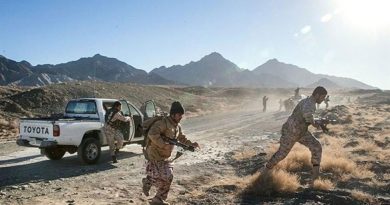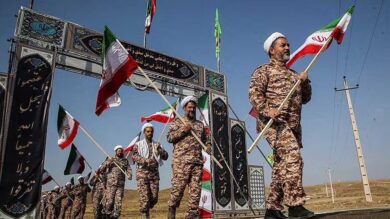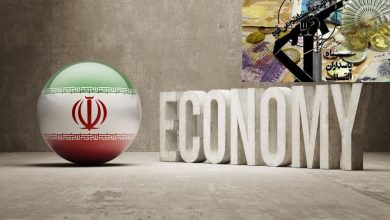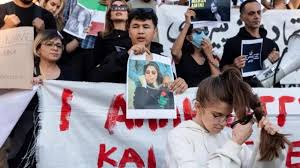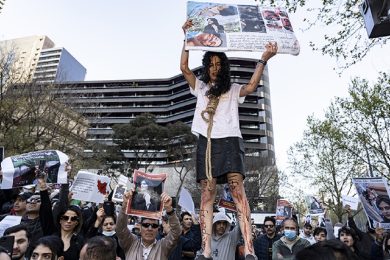Iran’s prisons are filled not with criminals but with women of conscience—those who dared to speak the truth, demand justice, or challenge inequality. These women are teachers, lawyers, students, journalists, and activists, detained under vague national security charges for their peaceful efforts to demand change.
Under the Islamic Revolutionary Guard Corps (IRGC), Iran has institutionalized the practice of using imprisonment, psychological abuse, and torture as tools of repression. These prisoners of conscience embody the spirit of resistance and the price of freedom in a state that criminalizes dissent.
This report examines:
• The mechanisms of arrest and sentencing
• Prison conditions and systemic abuse
• Stories of prominent female political prisoners
• The role of the IRGC
• Global reactions and recommendations
1. The Crime: Speaking Out
In the Islamic Republic, speaking out is a crime. Women who challenge compulsory hijab laws, gender apartheid, or government corruption are often charged with:
• “Propaganda against the state”
• “Acting against national security”
• “Spreading corruption on earth”
The IRGC Intelligence Organization, operating as a parallel power to the judiciary, arrests, interrogates, and detains women under secretive and abusive procedures.
2. The Arrest: Coercion and Secrecy
A. No Due Process
Most women are arrested without:
• A warrant
• Legal counsel
• Contact with their families
They are often:
• Blindfolded during arrest
• Transported to unknown locations
• Denied medical care
B. Interrogation and Forced Confessions
Women are subjected to:
• Prolonged solitary confinement
• Verbal abuse and threats against family
• Torture to extract televised “confessions”
3. The Prison Conditions: Inhuman and Degrading
A. Evin Prison (Tehran)
Known for:
• Solitary cells without light or sanitation
• Inadequate food, health care, and hygiene
• Constant surveillance and humiliation
B. Qarchak Prison (Varamin)
Described as:
• Overcrowded and disease-ridden
• Guarded by violent criminals
• Lacking clean water and basic necessities
Women in both prisons suffer:
• Psychological torture
• Sexual harassment
• Physical beatings
4. Who Are the Prisoners?
A. Narges Mohammadi
• Human rights defender
• Imprisoned multiple times for peaceful activism
• Continues to write from prison, documenting abuse
• 2023 Nobel Peace Prize laureate
B. Nasrin Sotoudeh
• Human rights lawyer
• Arrested for defending women removing hijabs
• Sentenced to 38 years and 148 lashes
• Continues legal activism under threat
C. Sepideh Gholian
• Journalist and labor rights activist
• Re-arrested after chanting anti-regime slogans post-release
• Endured repeated torture, solitary confinement
D. Atena Daemi
• Children’s rights activist
• Faced 7 years in prison for peaceful social media posts
• Spent years in solitary and denied medical care
These women are not exceptions—they represent thousands across the country.
5. The IRGC’s Role in Systematic Repression
The IRGC controls:
• Intelligence services
• Major prisons and interrogation centers
• State media for forced confession broadcasts
Their goal is not just punishment, but breaking resistance, sending a message to others: resist, and you will be erased.
6. The Impact: Families, Children, and Society
• Many imprisoned women are mothers separated from their children
• Families face harassment, surveillance, and loss of employment
• The broader society lives in fear and silence, knowing any act of dissent could lead to a similar fate
7. Global Response and Accountability
A. International Condemnation
Organizations like:
• Amnesty International
• UN Human Rights Council
• Human Rights Watch
have condemned Iran’s treatment of female prisoners and called for their immediate release.
B. Governments’ Sanctions
• The U.S.
, UK, Canada, and EU have sanctioned IRGC officials responsible for human rights abuses
• Global pressure is growing for the IRGC to be universally designated a terrorist organization
8. Recommendations
To support Iranian women prisoners of conscience:
• Demand the unconditional release of all political prisoners
• Sanction officials complicit in abuse
• Amplify stories of imprisoned women
• Support NGOs providing legal aid and advocacy
• Push for international legal accountability
Conclusion: Courage Behind Bars
Women in Iran are not just resisting in the streets—they are resisting behind bars, in solitary confinement, under torture, and under threat. Their stories reflect the cost of freedom and the strength of the human spirit.
They are not criminals.
They are conscience personified.
And they will help lead Iran into a future where justice, freedom, and dignity are not punishable by prison.
Join Our Newsletter!
Stay informed with the latest updates, news, and ways to take action in the fight for justice and global security. Sign up now to get updates delivered straight to your inbox!

